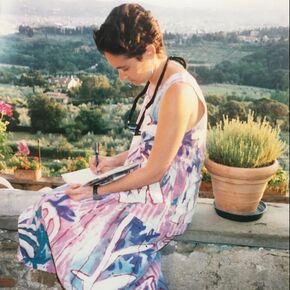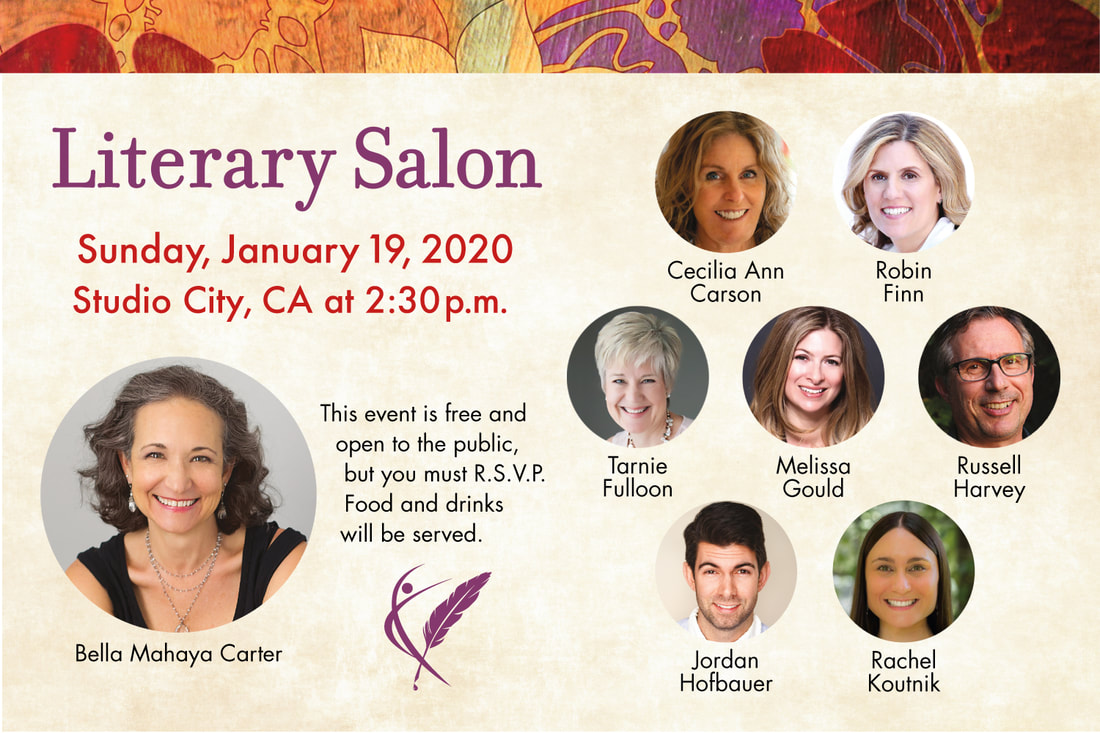|
Body-Mind-Spirit - Inspiration for Writers, Dreamers, and Seekers of Health & Happiness
 Photo Credit goes to my mom who took the photo of me (above) decades ago while we travelled together in Italy. Photo Credit goes to my mom who took the photo of me (above) decades ago while we travelled together in Italy. Many of my students and clients tell me that they have a hard time finding the time to write. This is totally understandable. Our lives are busy. We have obligations and commitments we must fulfill, or face tangible consequences. Writing is not like this. Nobody knows or cares if we don’t write. But people who have the urge (calling) to write and don’t act on it often experience dissatisfaction, even angst. They feel like they have an itch they can’t scratch. Part of the problem—what keeps people from sitting down to write—is their own imagination. They’ve made up stories about what “writing” is supposed to look like. They assume they need to carve out huge chunks of time. They believe that they have to feel energized or inspired. They might envision their writing hurting people they love. They may worry they lack talent. They’re convinced they have to know what they want to say, despite the fact that writers often have no idea what’s on their minds until they’ve written.
Drop Your Limiting Stories and Write Where You Are When you realize that these inner voices are keeping you from doing what you say you want to do—write—you get to show up exactly as you are. This means you accept yourself and your circumstances, and instead of feeling like you have to stretch into some impossible, imagined version of yourself as a writer, you take “writing” off its pedestal, cradle it in both hands, and invite it into your crowded, messy, busy life. Ask yourself these questions: How can I make writing fit within the real world that is my life? How can I create just a little bit of space to write? Can I sit down and scribble in a journal for twenty or thirty minutes once or twice a week? How about fifteen minutes once a week? Start small. Some people don’t think this qualifies as writing, but experienced writers know better. Small efforts taken over time become large. Minutes become hours, so have at it: dump thoughts out of your head and onto the page. Romp around. Have fun. Take your shoes off. Strip naked. No one’s watching and there aren’t any rules. Until you start to take this process seriously, at which point you might want to hit the pause button Writing Is Not Heavy Author Jack Canfield tells a story about his spiritual teacher pointing to a boulder in the woods and asking, “Is that heavy?” Jack replied that of course it was, to which his teacher said, “It’s only heavy if you pick it up.” Trick question? Maybe, but it serves as a lesson for writers: Don’t pick up and carry heavy thoughts that prevent you from writing. If you show up for yourself in this way—even once a week—you’ll be writing without “writing,” and effortlessly developing a practice. I advise people to work by hand at this stage, which ignites the heart-hand connection. Intimacy flourishes when we bring pen to paper. Author Natalie Goldberg says, “Just because you can drive a car doesn’t mean you should stop walking.” Take one step at a time. Feel your way. Type and Edit Your Work Once you’ve developed a “writing without ‘writing’” practice, you may want to expand that by devoting a small amount of time each week to typing up what you’ve scribbled, editing as you go. When you feel like you’ve shot your creative load with any given piece, set it aside. When you allow time to pass and come back to your work, you see it with fresh eyes. Edit some more. You’ve no doubt heard the expression “writing is rewriting.” Create Lists Keep lists of (a) journal entries that feel relevant or alive in some way that you’d like to develop, (b) typed and edited pieces in process, and (c) places to send your work when it’s ready. Now, to recap, you’re basically just showing up a couple times a week to scribble and play in your journal, and also devoting one hour a week to typing, editing, and developing ideas that surfaced during your playtime scribble session. With these two practices in place you are “writing without writing.” But really, you’re writing! Congratulations! Keep going. Find Trustworthy Guides It’s a game-changer to get the right kind of feedback on your writing. This means someone who can hold an unconditionally loving space for you and your work--and who knows the art and craft of writing. This person can help you see what you have, identify themes, water seeds ready to sprout, keep you honest while bolstering your courage, and be a cheerleader for you while supporting your process and expanding your reach. Many of my students and clients simply do not see the value of their own writing. They are convinced that what they’ve written is garbage. The problem here stems, once again, from their imagination. They are making up stories in their head as voraciously as on the page. That’s okay. Learning to recognize this habit eventually liberates us from it. A good guide will help you see treasure where before you saw trash. Share Your Work Thoughtful, compassionate critiques will help you grow as a writer, and if you’ve been enjoying these practices, the day will come when you’ll want to share your work. Again, start small. Share with your writing circle, class, group, coach, editor, or mentor. As your confidence (and skills) grow, start to share on social media. Share at public readings. Share on blogs—yours or somebody else’s. If you don’t have a blog, create one. Share with newsletter subscribers. Share with people whose work you admire. Even though writing is a solitary act, writing careers thrive on relationships. Reach out. Find a writing community. My dad used to say, “If you love your work, you’ll never work a day in your life.” I’d like to add: If you don’t think of what you do as “Writing” with a capital “W,” if you shift your thinking about what it means to write and be a writer, and allow yourself to have a good, long scribble, rant, or rave, free from ego demands or expectations, you will be living the “writing without ‘writing’ life”—and loving it! If you’d like some writing inspiration and live in Southern California, please consider joining us for a literary salon THIS Sunday. The event is free and open to the public, but you must R.S.V.P. If you’d like support “writing without ‘writing’” you might enjoy my writing circles. I have one space left in my online writing circle, and two spaces left onsite. Classes begin January 29. The salon is a great place to listen to what goes on here and to celebrate brave people and their writing!
1 Comment
|
Receive over 80 writing prompts from Where Do You Hang Your Hammock to ignite your creativity, gain clarity, and reach your personal and professional goals! You'll also receive my inspirational monthly blog/newsletter. |
“Where the spirit does not work with the hand there is no art.” —Leonardo da Vinci


